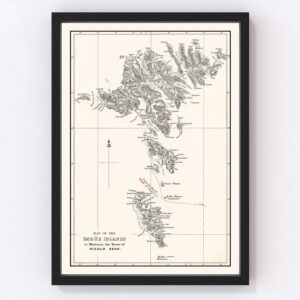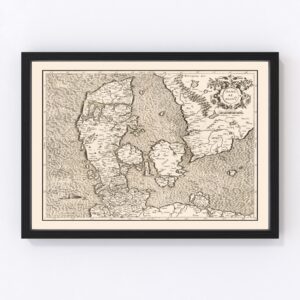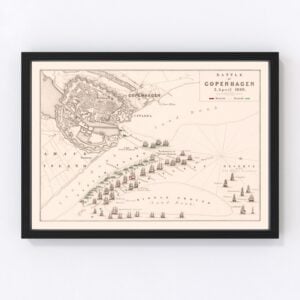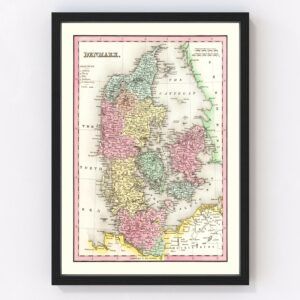Old Maps of Denmark
Take a look through our collection of Old Maps of Denmark.
Denmark is a nordic country located within Europe. The country consists of the peninsula of Jutland, as well as an archipelago made up of 443 islands. The country spans a total land area of 42,943 square kilometers (16,580 square miles), and is home to a population of 5.91 million people. A great majority, around 800,000 people, live within the capital and largest city of the country, Copenhagen. Denmark is known to be one of the most developed countries in the world with a high standard of living. The current Queen of Denmark is Margrethe II, while the Prime Minister is Mette Frederiksen.
The topography of Denmark is relatively flat, with an average height of the land being 31 meters above sea level, or 102 feet. The highest point of the country is Møllehøj, which stands at an altitude of 170.86 meters, or 560.56 feet high. Although the altitude of Denmark is very low in comparison to surrounding European countries, it is still safe from rising sea levels. The climate of Denmark is temperate, which is known for its mild winters and cool summers. Because of its location in the north, Denmark experiences short winter days and long summer days.There are two ecoregions within Denmark – the Atlantic mixed forests and Baltic mixed forests. Prior to land being cleared for agricultural purposes, the land was covered with numerous species of trees, like oak, elm, lime, as well as beech trees. Commonly found mammals include deer, as well as much smaller animals such as hares and hedgehogs. Birds are abundant within Denmark, with around 300 species. Fish, like cog, herring, and plaice are commonly found within the waters of Denmark and also provide a basis to fishing for economic purposes.
The economy of Denmark is home to one of the highest GDP in the world, along with highly developed social services that aid it. The industries the economy is based on include service industries, trade, manufacturing, as well as a small percentage based in agriculture and fishing. Denmark’s economy is the 10th most competitive economy in the world. The country also places first for workers’ rights. Some of the largest exports to come out of Denmark include packaged medicaments, pig meat, refined petroleum, electric generating sets, as well as iron structures. Denmark is home to no minimum wage legislation, so workers make around US$20, while their counterparts in the US make half.
The population of Denmark is one of the oldest in the world, with the overall population’s average age being 41.9 years old. Despite low birth rates all throughout the country, it continues to grow 0.59% yearly, due to increased migration as well as longevity. The five largest cities within Denmark are Copenhagen, Aarhus, Odense, Aalborg, and Esbjerg. The population of Denmark is often regarded as the happiest in the world, due to the fact that the country has highly regarded education and health services, as well as a low level of income inequality.









Old Maps of Denmark
Take a look through our collection of Old Maps of Denmark.
Denmark is a nordic country located within Europe. The country consists of the peninsula of Jutland, as well as an archipelago made up of 443 islands. The country spans a total land area of 42,943 square kilometers (16,580 square miles), and is home to a population of 5.91 million people. A great majority, around 800,000 people, live within the capital and largest city of the country, Copenhagen. Denmark is known to be one of the most developed countries in the world with a high standard of living. The current Queen of Denmark is Margrethe II, while the Prime Minister is Mette Frederiksen.
The topography of Denmark is relatively flat, with an average height of the land being 31 meters above sea level, or 102 feet. The highest point of the country is Møllehøj, which stands at an altitude of 170.86 meters, or 560.56 feet high. Although the altitude of Denmark is very low in comparison to surrounding European countries, it is still safe from rising sea levels. The climate of Denmark is temperate, which is known for its mild winters and cool summers. Because of its location in the north, Denmark experiences short winter days and long summer days.There are two ecoregions within Denmark – the Atlantic mixed forests and Baltic mixed forests. Prior to land being cleared for agricultural purposes, the land was covered with numerous species of trees, like oak, elm, lime, as well as beech trees. Commonly found mammals include deer, as well as much smaller animals such as hares and hedgehogs. Birds are abundant within Denmark, with around 300 species. Fish, like cog, herring, and plaice are commonly found within the waters of Denmark and also provide a basis to fishing for economic purposes.
The economy of Denmark is home to one of the highest GDP in the world, along with highly developed social services that aid it. The industries the economy is based on include service industries, trade, manufacturing, as well as a small percentage based in agriculture and fishing. Denmark’s economy is the 10th most competitive economy in the world. The country also places first for workers’ rights. Some of the largest exports to come out of Denmark include packaged medicaments, pig meat, refined petroleum, electric generating sets, as well as iron structures. Denmark is home to no minimum wage legislation, so workers make around US$20, while their counterparts in the US make half.
The population of Denmark is one of the oldest in the world, with the overall population’s average age being 41.9 years old. Despite low birth rates all throughout the country, it continues to grow 0.59% yearly, due to increased migration as well as longevity. The five largest cities within Denmark are Copenhagen, Aarhus, Odense, Aalborg, and Esbjerg. The population of Denmark is often regarded as the happiest in the world, due to the fact that the country has highly regarded education and health services, as well as a low level of income inequality.
